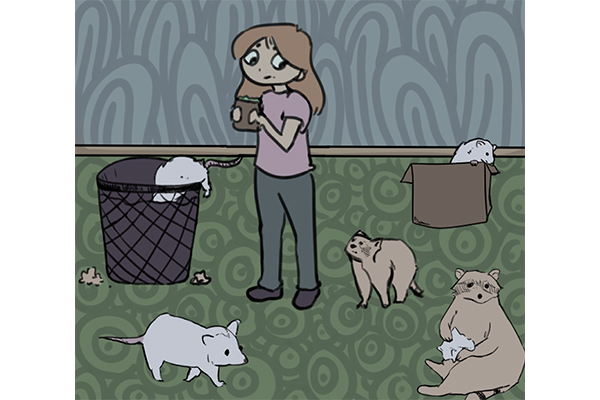No furry friends: UT-Austin warns students to beware of raccoons after increase of campus encounters, 3 bites reported
May 8, 2022
Editor’s note: This article first appeared in the May 3, 2022 flipbook.
When Wren Thomson took a late-night walk on campus last semester, he didn’t expect a slow, stalking raccoon to chase him past the tower.
The sickly silver mammal charged at Thomson, who was passing by Turtle Pond that warm October night.
“I was trying to tell him I don’t have any food for you, … but he didn’t listen,” the psychology sophomore said. “He got within 10 feet of me. This one was actively trying to approach me and trying to get close to me. I ran and then I looked back and it was chasing me up the (Flawn Academic Center) ramp, which was just ridiculous.”
According to the Office of Campus Safety, Thomson is one of many students who have had encounters with campus raccoons, including three who were bitten by a raccoon and subsequently received rabies vaccinations.
In a tweet last Wednesday, the office warned students, faculty and staff to not feed, pet or take photos with the raccoon believed to be sheltering outside of the McCombs School of Business and Perry-Castañeda Library. The office believes raccoons have become bolder after being repeatedly fed by humans, and may attack after feeling threatened by close contact, or if they have offspring nearby.
“Safety issues with raccoons occur when humans purposely or accidentally provide for food or shelter for raccoons (to) take advantage of,” the office said in a different tweet. “Raccoons are smart and opportunistic. They learn and quickly lose their natural fear of us.”
Students can report animal incidents to the Animal Make Safe Program, part of UT Environmental Health and Safety, which monitors wildlife on campus. Nocturnal wildlife on campus is more likely to be seen during the day due to construction and campus activity, said Carin Peterson, UT Environmental Health and Safety department safety specialist.
“We’re an urban campus, but we have a lot of wildlife,” Peterson said. “We have a creek that serves as a highway for wildlife to come through our campus. Our wildlife are wild animals, and we do not want people to touch them. You can view them from a distance and enjoy them, but don’t approach them.”
UT Environmental Health & Safety advises anyone who is bitten or scratched by any animal to thoroughly wash the infected area and seek medical advice immediately. Animal bites should be examined by a physician urgently. Faculty and staff can contact the Occupational Health Program. Students can call University Health Services.



